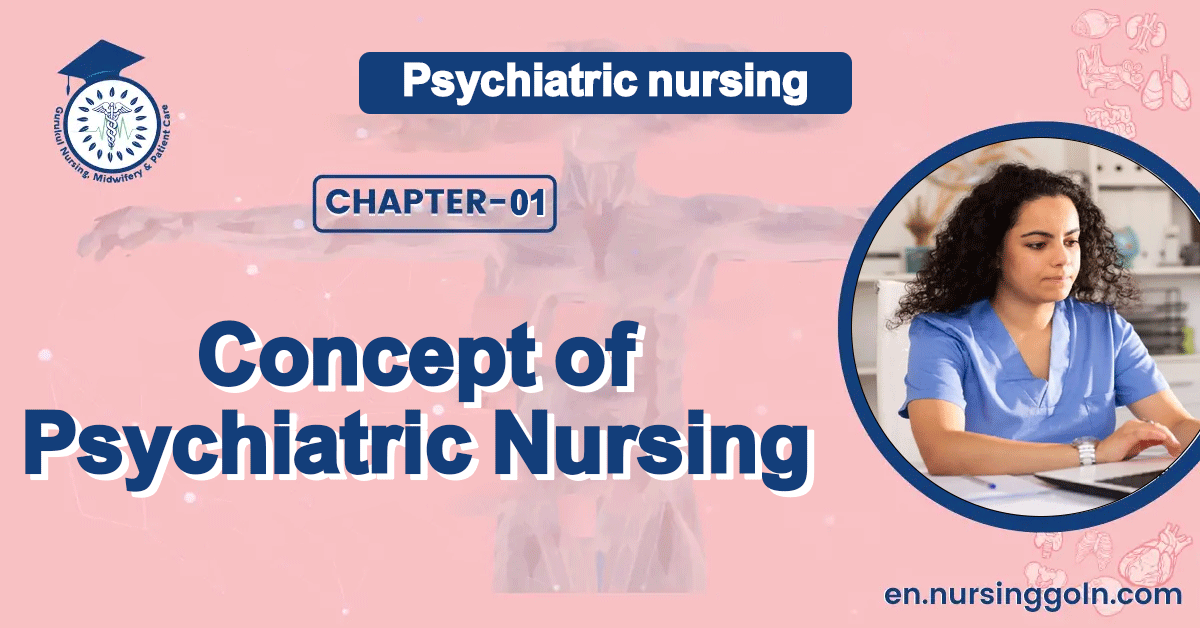Concept of Psychiatric Nursing – This book covers the entire syllabus of “Psychiatric Nursing” prescribed by the Universities of Bangladesh- for Basic and diploma nursing students. We tried to accommodate the latest information and topics. This book is an examination-friendly setup according to the teachers’ lectures and examination questions.
At the end of the book previous university questions are given. We hope in touch with the book students’ knowledge will be upgraded and flourish. The unique way of presentation may make your reading of the book a pleasurable experience.

Concept of Psychiatric Nursing
Psychiatry
The word, ‘Psychiatry’ is derived from Greek word, ‘Psyche’ means ‘soul or mind’, ‘iatros’ means ‘healer’.
Definition of psychiatry:
‘A medical specialty where experts in the field studies the abnormal behaviour of the individual, its causes, manifestations, patho-physological changes, diagnosis, treatment, rehabilitation and prevention of mental illness’.
[Ref: KP Neeraja/P/Vol-1/36]
Or,
‘It is a branch of Medicine which deals with the diagnosis, treatment and prevention of mental illnesses.
(Ref: L P shah & H Shah, 1997)
Define psychology
Psychology
Psychology is the scientific study of the mind and behavior. Psychology is a multifaceted discipline and includes many sub-fields of study such areas as human development, sports, health, clinical, social behavior and cognitive processes.
Or,
Psychology is the science investigating the behaviour of mental and emotional life.
[Ref: S Nambi/2]
Or,
Psychology is the study of the mind and behavior, according to the American Psychological Association. It is the study of the mind, how it works, and how it affects behavior.
Or,
Psychology is the study of mind and behavior. It is an academic discipline and an applied science which seeks to understand individuals and groups by establishing general principles and researching specific cases.
In this field, a professional practitioner or researcher is called a psychologist and can be classified as a social, behavioral, or cognitive scientist. Psychologists attempt to understand the role of mental functions in individual and social behavior, while also exploring the physiological and biological processes that underlie cognitive functions and behaviors.
[Ref: www.wikipedia.org/]
Psychiatric Nursing
Psychiatric nursing:
“Specialized area of Nursing practice, combination of science and art by employing theories of human behaviour applied in the diagnosis and treatment of human response to actual or potential- Mental Health problems.”
[Ref: KP Neeraja/P/Vol-1/36/]
Or,
Psychiatry nursing can be defined as primarily the process of developing therapeutic interpersonal relationships to assist those with psychological development and/or physiological problems to develop their maximum potential.
Or,
[Ref-Maya George/2/621]
‘It is a specialized branch of Nursing, in which the Nurse utilizes their personality, knowledge related to psychiatry theory within the available environment in order to bring the therapeutic changes in the patients’ feelings and behaviour’.
(Ref: KP Neeraja/P/Vol-1/361]
Or,
‘It is an interpersonal process, whereby the professional nurse ists the individual, family or community to promote mental health, to prevent Mental lilness or to cope up with the experiences of illness and suffering to find the meaning in these experiences of illness and suffering’.
[Ref: KP Neeraja/T/Vol-1/36/]

Aims of psychiatric nursing
Aims/Objectives of psychiatric nursing:
- 1. Identify biological, psychological & social factors which contribute to the occurrence mental life.
- 2. Recognize early sign of mental health promotion.
- 3. Differentiate major types of mental illness & their treatment.
- 4. Describe essential elements of psychiatric & community mental health care
- 5. Carry out psychiatric nursing are for dealing with specific behaviour.
[Ref: Clinical Consult to Psychiatric Nursing/I/7/]
Objective of psychiatric nursing
A. Overall objective: Students during their mental health Nursing Clinical posting are able to apply the basic principles & concepts of mental health nursing assist in therapeutic
interventions & in Crisis situation
B. Specific objectives: Students are able to-
- Understand the underlying Principles from social and behavioral sciences and utilize them in planning, implementing and evaluating the mental health nursing
- care based on the needs of patients and their families.
- Assess patients with various mental health problems.
- Select and administer care to patient in psychiatric setting.
- Assist in various therapies.
- Motivate patients for early treatment and follow-up
Primary goals of psychiatric nursing
Primary goals of psychiatric nursing:
1. Promotion of mental health:
➤ Recreation
➤ Moral up life activities.
➤ Provide activities.
➤ Leading to happiness & satisfaction.
➤ Improve of social security.
2. Provide health care to mentally ill patient:
➤Outdoor care
➤ Indoor care
➤ Emergency service in emergency department
3. Rehabilitation:
➤ Vocational rehabilitation.
➤ Institutional rehabilitation
➤ Parental counseling.
➤ Special education.
[Ref: Clinical Consult to Psychiatric Nursing/1″/]
Essential psychiatric nursing skills
Essential psychiatric nursing skills:
A. Personal Skills: Self-awareness and understanding is a fundamental aspect in psychiatric Nursing experience. It will help them to understand clients and their family members. Emotional maturity and psychological health (or Mental Health) will make them to adapt to
any type of cultural settings. Nurse should act as active listener respects the clients feelings, treat the client as an individual, support them with their effective communication, wins the confidence and trust of the client; carry out the procedures with efficient skills, reassuring with explanation, honesty, compassion and skillful in carrying out activities, working within personal and ethical limitations or boundaries.
B. Counselling Skills: Unconditional love, empathy, genuineness, warmth, mutual respect, rapport, establishing satisfactory relationship, winning the trust and confidentiality of the client, provision of conducive and comfortable environment to the client; active listening, respecting the client, acceptance, non-directive lead, persuasion, questioning, interpretation, Paraphrasing, advice and suggestion, constructive criticism, confrontation, summarization or reflection of feelings, open-mindedness, objectivity etc. are the components of psychiatric
counselling.
C. Communication Skills: Communication is the basic element of human interaction which allows people to establish, maintain and improve contacts with others. Nurses should be aware of both verbal and non-verbal type of communication. Verbal skills include encoding and decoding skills, intellectual skills-perceiving, memorizing, judging and abstracting and non-verbal skills, e.g. postures, body language, gestures.
D. Interpersonal Skills:It is the interaction between two people or in a small group. Psychiatric Nurse has to observe the interaction pattern and socialization of the client along with family members.
E. Intrapersonal Skills:It occurs within the individual, they consider their thoughts internally so they can express themselves appropriately to others. The goals of intrapersonal communication is having self-awareness, which is influenced by self-concept and feelings of self-worth.
F. Teaching Skills: Teaching is an interactive process that promotes learning aspect of the client. It consists of a conscious and deliberate set of actions that helps the individuals to gain a new knowledge and perform new skills.
G. Observational Skills: The Nurse observes the clients’ behaviour for level of function, consistency and congruency. This information adds greater depth to the objective data base. The level of function includes physical, developmental, psychological and social aspects. Observation of the level of function is, what the Nurse sees in the client doing, rather than what the client says he or she can do. It is the degree of function at which the client is operating.
H. Behavioral Skills: These skills are based on concepts of conditioning and BF Skinners principles of learning. Nurse will use systematic application of scientific principles of learning, which will be used in psychotherapeutic modality, aims at changing maladaptive behaviour by substituting it with adaptive behaviour, permanent change in behavior occurs as a result of practice or experience.
Nurse should have familiarity in vigilant observation of the behaviour of client, concentrate on symptoms of the client as they are target for therapy and a commitment for objective evaluation of efficacy is required.
I. Supervisory Skills: Supervision and monitoring of clients’ behavior and activities, guiding and counselling the client are essential for nursing professionals to protect the client to promote his wellbeing and to ensure qualitative care
J. Crisis Skills: The psychiatric emergency situations like, the client with suicidal tendency, assaultive behaviour, aggressive behaviour, acute alcohol intoxication, self-harmingtendency or harming others etc.
K. Recreational Skills: In the clients with mental illness, always there will be alteration in moods or emotions; hence it is the responsibility of psychiatric Nurse to divert the mind of the individual by constructively utilizing their time in leisure activities.
[Ref: KP Neeraja/I/Vol-1/68-701]
Psychiatric nurse
Psychiatric Nurse:
Psychiatric nurse is a person who provides nursing care to the mentally ill person.
Or,
Psychiatric Nurses treat patients diagnosed with conditions like schizophrenia, bipolar disorder, and depression. They’re also trained in behavioral therapy, which allows these nurses to teach patients, and their loved ones, how to deal with challenges that go along with psychiatric disorders.
Qualities of psychiatric nurse
Qualities of an ideal psychiatric nurse:
A nurse working with psychiatric patients should:
1. Be sympathetic and understanding
2. Have patience and a capacity to listen
3. Be a good observer
4. Be bold and helpful to the patient
5. Have non-judgmental attitude towards the patient’s behavior
6. Be available during an emotional crisis
7. Be confidential.
[Ref: S Nambi/2/101]
Function of psychiatrie nurse
Details function of a psychiatric nurse:
Role of a Mental Health Nurse includes three domains:
- Direct care
- Communication
- Management.
In all these 3 domains teaching, co-ordination, collaboration, delegation or relegation components are overlapping.
Direct Care Activities:
1. Provides conductive, comfortable and safe therapeutic environment for the client; protects them from harmful injuries caused by himself or from others.
2. Assesses the client’s needs; plans and provides individualized Nursing Care by meeting their needs by fulfilling short term and long term goals
3. Conducts mental status examination, assists in carrying out diagnostic tests
4. Meeting psychological and physical needs
5. Creating a therapeutic milieu
6. Assisting in therapeutic modalities
7. Help the client to be in touch with reality
8. Assist the client to improve social skills, communication skills, Independent living skills and coping skills
9. Accurately observes and documents client’s behaviour
10. Protect the client from the after effects of abnormal behaviour
11. Educating the client to cope up with the stressful situations
12. Educating the patient, his family to live and to rehabilitate with the disabilities.
13. Cooperating with other health team members in provision of care and promoting the health status of the client
14. Provide the interventions based on situations like stress and crisis management, community education, family interventions, group therapy, self-care activities, work and case management, play therapy, counselling services; promotive preventive and rehabilitative services
15. Providing feedback to the client based on observations made by the health care professionals.
16. Involve client, his family and significant others in provision of care and in meeting the needs of clients
17. Provide opportunities for the client to assume responsibilities in his family life
18. Encourage the client to take decisions in his life properl
19. Provides facilities for the clients in taking care of themselves.
20. Makes the client to understand his own limitations
21. Teaches the clients to channelize their energy in constructive activities
22. Identifies high risk groups and provides base line community health education or early identification of problems, health care services availability, therapeutic modalities, and prevention of complications and relapses occurrence; self-care activities; training in attaining skills etc
Communication Activities:
1. Establishes and maintains good interpersonal relationship with client, family and other health care professionals
2. Communicates the client’s behaviour to the health care professionals and other concerned personnel regarding MLC cases to the police intimation.
3. Organizes and participates in clinical case conferences, peer review, staff meetings
4. Documents the observations and treatment plans
5. Acts as a liason between client and family; family and community; client to health care professionals
6. Prepares and maintains records and reports
7. Transcribes orders, verbalizes and reports care
8. Shares the knowledge of varied disciplines with concerned professionals; availability of resources and community agencies with concerned families and others, who require those services.
Ward Management:
1. Maintains ward cleanliness and takes proper precautions to prevent accidents or injuries
2. Periodically evaluates client’s progress and reports to concerned authorities
3. Follows clinical rounds and reports their observations and inform to the respective disciplines maintains the records and reports which are necessary in the wards
4. Take over and hand over cases according to shift wiseen
5. Supervises Class ‘D’ employees and other student nurses functions or activities
6. Plans the budget and try for its sanctioning; after it comes allocate the resources
7. Provides consultation services
8. Encourages the family and friends involvement
9. Co-ordinates and collaborates other health care services provided by the respective team members
10. Delegates, the responsibility and assignments to other co-professionals
11. Maintains public relations
12. Periodically evaluates the activities done by the professionals in the ward
13. Develops policies and procedures
14. Plans and conducts in-service education, continuing education activities or programmes, staff developmental activities. Performance evaluation.
15. Mediates and tries to solves the problems by utilizing potentialities, coping strategies
16. Conducts research activities and publishes its results
17. Assists in recruitment activities based on the policies of the organizational
18. Plans strategically to solve or attack the problematic situations.
(Ref: KP Neeraja/1/Vol-1/65-66/)
What should avoid to do with psychiatric patient
The following things which a nurse should not do to her psychiatric patients:
1. Pass comments
2. Laugh at
3. Be sarcastic mo
4. Be biased
5. Avoid contact
6. Let him down
7. Label him.

Terminology Related to Psychiatry
Terms related to Psychiatry in general:
1. Psychiatry: It is a part of medical science that deals with the diagnosis and management of mental disorder
2. Psychology: It is the scientific study of behaviour and mental process.
3. Psychosis: they are characterized by a withdrawal from quality living in a wall of fantasy.
4. Neurosis: The pt. suffers from emotional or intellectual disorder but he does not low touch with reality.
5. Attitude: Positive or negative evaluations of people, objects, ideas or events.
6. Intelligence: Capacity to act purposefully, to think rationally and to deal effectively with the environment
7. Insight: Understanding and judgment of one’s own condition and its effect on others.
Terms related to Psychiatry in disorders of memory:
1. Apraxia: Impaired ability to carry out motor activities despite intact motor function.
2. Memory: It is the ability to store information so that it can be recalled and be used at a later time
3. Amnesia: Loss of memory. It may be anterograde or retrograde.
Terms related to Psychiatry in disorders of consciousness:
1. Consciousness: A state of awareness of self and the environment.
2. Confusion: It is a state of impaired consciousness in which there is inability to think clearly
3 Disorientation: Confusion about the date, place, person or time of day,
4. Stupor: It is the altered state of consciousness in which the patient is immobile, mute and unresponsive but appears to be fully conscious.
5 . Conditions: It is found in schizophrenia, depression, mania, hysteria and acute reaction to stress,
Terms related to Psychiatry in disorders of emotion:
1. Phobia: Persistent, irrational fear of a specific object, activity or situation that results in a compelling desire to avoid the phobic stimulus.
2. Apathy: Lack of emotional expression
3. Blunt or Flat: Reduced emotional expression
4. Emotional liability: Repeated, rapid and abrupt shifts of emotion.
5. Dysphoria: An unpleasant mood such as sadness, anxiety or irritability.
6. Anxiety: Apprehension, tension or uneasiness that stems from the anticipation of danger which may be internal or external.
7. Agitation: Feeling of inner tension expressed with excessive motor activity
Terms related to Psychiatry in disorders of thought:
Delusion: It is a false belief in something which is not a fact.
Terms related to Psychiatry in disorders of perception:
Illusion: It is a false interpretation by the senses of an external object or stimuli, e,g. a man sees a rope and take it as a snake,
Hallucination: It is a false perception of special sense without any external object or stimulus.
